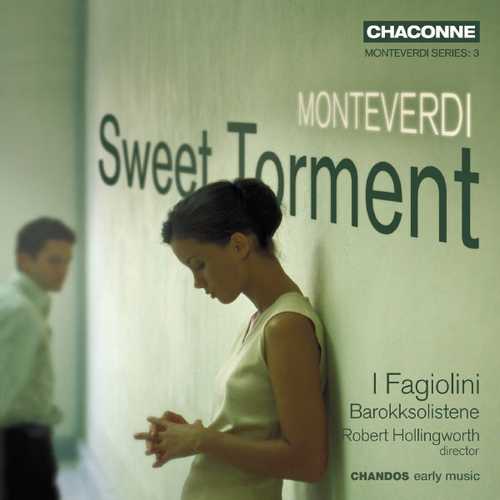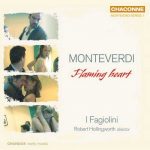

Composer: Claudio Giovanni Antonio Monteverdi, Luca Marenzio
Performer: Eamonn Dougan, Nicholas Mulroy, Clare Wilkinson, Eligio Quinteiro, Julia Doyle, Charles Gibbs, Joy Smith, Anna Crookes, Nicholas Hurndall Smith, Steven Devine, Bjarte Eike, Peter Spissky, Terence R. Charlston, Catherine Pierron, Jonathan Sells, Fiona Ritchie, I Fagiolini, Barokksolistene
Conductor: Robert Hollingworth
Format: FLAC (tracks)
Label: Chandos
Catalogue: CHAN0760
Release: 2009
Size: 794 MB
Recovery: +3%
Scan: yes
01.Monteverdi: Questi vaghi concenti
02. Monteverdi: T’amo mia vita (Book 5), SV 104
03. Monteverdi: Ohime il bel viso, ohime il soave sguardo
04. Marenzio: Zefiro torna e ‘l bel tempo rimena
05. Monteverdi: Zefiro torna
06. Monteverdi: Ohimè Dov’è Il Mio Ben
07. Monteverdi: Si dolce è’l tormento (from Libro Nono di Magrigali e Canzonette)
08. Monteverdi: Or che’l ciel e la terra
09. Monteverdi: Gira il nemico, insidioso amore (Book 8), SV 148
10. Monteverdi: Mascherata dell’Ingrate, “Ballo delle ingrate”
In this third survey of their Monteverdi madrigals, I Fagiolini once again demonstrate the astonishing range of the composer’s secular art, leading us from the works of his early Mantuan maturity to the Baroque glories of his Venetian years, before returning us to the seconda pratica in Il Ballo dell’ Ingrate.
By the time of Monteverdi’s Fifth and Sixth books, the madrigal, had acquired a new energy through the refreshed desire to move its listeners all the more strongly. In listening to a collection such as this, what most impresses and delights us is the sheer variety of Monteverdi’s expressive art. The two Petrarch settings from Book Six, for example, though relatively old-fashioned in their use of unaccompanied five-voice texture, show the most refined ear for the fluid emotional tenor of their texts.
The two works from Book V make a pleasing parallel with these two Petrarch settings: T’amo, mia vita also makes play of the quasi-dramatic alternation between solo soprano and lower voices, and Questi vaghi concenti likewise pits the carefree joy of the natural world against the plaints of the lovesick poet. In the Eighth Book, the process of distinguishing and separating each successive affetto reaches a climax. Il Ballo delle Ingrate, published in the Eighth Book but written some thirty years previously, brings us full circle back to the Mantuan years and the birth of opera. Like Orfeo, Il Ballo delle Ingrate breathes an air of triumphant discovery, of fresh powers, of new worlds of expression opening up for the composer – worlds whose exploration would be his unique and ever-fascinating achievement.
This series has offered I Fagiolini the opportunity to offer the listener contemporary passion and scholarship, and has achieved their ambition to challenge the accepted pre-eminence of the Italian groups. This is Monteverdi for both the 16th and 21st century.



